英语语法ppt课件
合集下载
《小学英语语法》PPT课件

1. 直接在单词后面加S。如car-cars
2. 以s,x,sh,ch结尾的单词,在单词后面加es。如:classclasses
3. 以o结尾的单词,若是有生命的,单词后面加es,如 tomato-tomatoes;若是无生命的,则加s,如:pianopianos
4. 以辅音+y,变y为i,再加es;以元音+y,直接加s
. 1.一般情况下直接加“ly”,如quick---quickly
n用时o形法w间容23但 形,.、词t以①l容绝和oh少“比n词大e多数gy变多频较n”以t数结a副数等,elol率尾单词以结c级f的通el音尾et结副构e,a常的先节尾nn成是形将词形的,加的容“a形容l词y:规yl容w”,词其,改则词a要变成=仍变y去化“词然s化掉有i”直尾,,规e再u接再加律加s加加可u“e--llr循aylyy。。或”,l请l,例例ye记如如,如se住ht::aa以pptrrop下ullyeiy口t--e-,t-r诀-thpuoaol:ypld等ipteial。lyyy, w, idlae-tweid,elny等e。xt,lastday,already(已 经副)词,一 分g在长l般别eon直举n的句g接例ee高r加如r中ta的a,下lll“ :l可ey干r元(c净一作ele”的去a般状nee加r地语,“),辅表,fyr”e语改qi加,u,补e“n语let”l结y,尾(e定改频y语。繁。), s(2hba3cwH他Y你D她L让F这ea)eec)eooeeo很工英呆我儿lrrrltu地方ol在 两 最 比edo'oeelwqthp另 一 q二 三 g另 此 例 需 再却 res,drisowvuaouesfvsu,快作语在们很较l最②l大l较l最③b大b较、、、看外外外句注一点式eupnoisie英个高较caaaoebmcesprii,thptsrs—rrrngg在以某转: 意 样,,:yktlal.长长的大大的大rh副 部igggeyy-,以以l)努讲家出难eogbI—g(qedhk副副tth—y(eee形辅些a化:,语物级级lnlreee词分这u的的的的的aeimdoafuqrs,se晚重热reoseorhrsil容音以副—jlueartt还名就ie力地吗去弄,l结l.yatpkeiha词词p)w很ti里品公公eounttl的读的较最较最较,词字辅词plpclnhtaahesto可词需b河yya尾eokprrdtn,tititEn词 母 音。h闭高高晚晚热tat。相吧到?lenlnsst以 加i要r(oe里l.l::好瘦ly少l,比式式eyaeey的sgesyi冷,,尾 加 字在nrcn;由 后大pr音的的的的的fi有s(,trhbhy的的idem,ovo当。食ct单t直 母英ybnegle形 缀家地h很三较;;节yoe结cao静r.eirr较最较最较接 加i语aca.ml作音lrnrt容 也学多feoei尾hrea结r(好物lns加 不中ct干干好好瘦)a个用主主deuy词 可会scy水节,u地的ernhalt尾k表发-,ht(lw净净的的的r加 变在有l。nnay.e作。。形形yt适,,;音及语比语o有,s。o前 成特h些)vTdeg的的h容lt语容fo,eh的m部如e缀 副定词且o状ovave当词eg以较+A,p词r字e分:r词语既arem,r结re)要lwe-ybyewaso母+是e语得u境可,r地等ah=?变如上级尾t,oesrllea她b,a来.w-中以ini词o词y结 :rtctm动p只)e(e的为a),reh(判作e的是如aueia尾尾,dser动错l有inl断形evl,t:形nl和ytsy词然(l-a作l加oho。py;a物e它容一.t容(d以ou后aihni词wde有mrdr们词(el+词r个,-向表.t再,oxull品r((py或yh各,ua而tena又e加+i辅ef。礼ddh结odeu作自e前语非e.可作j-vs比sl中音.le-尾utP).ry的th副a-)以,,貌l。ae状e+e的ss字他地)词l定词r较l作a最yop如,lo,形范s说性u母ysf。地e副e语u:d)oo容话b语(。o级l*的st词lu(焦u围ynf词*a的例m)st;rf),d形,的如n,ey,,,要c+声句v-ta虑词iebhe.容rppot先)t音r:aude用Tdhwhorraos去词f很hol地uaoiyaamawls,掉lhy,大-n最yu=nmn;crtkiee,a.).ae,dm所du,+双y(rn,然race高oo,u作g以ledh主f写后symurunj,upy房.,l(uv)f再l-级这a状ycap,自ee间音语is;dn加rne个tsyahd里g乐,d-o语r,m,豪ltyBwi每ii辅声patl或eayutoel个太;ac音eif-nt)t地ulrueh,ey人w大ylsalw.字。-tyslh(,都,i,(ayi)请yd,如o母c楼d,-o能ep(ie调v:nn,eea,.sn听tl)f低oseos上u多o立iru.到再llr点iylrdiyd谢fb他m等加;。地tl即e。els的。yH-elaot,T话,eer)wh由)lr,或osl。re-ypi于srbdueel(l,oe这ayoit正wss;ksf类tsltwimyrinul词;d常ouneqauc词-eutdhslri地性c,luwetyklna虽yaa-,oq;t)si不eubugr,rhgies同coihfnnko,a.t,vl但ltySerhs;e-ot词elt,y,形 w4me5L让.a修)x)e.au他tTt程疑r饰rc另 E多 hh单s以 以mehhlhaen出yb最 ④e容e较外音音vl度问impae名ge-lm,eiaasvp结lyg节 节,l结i大 易容ly还ssysi以y去gev-尾副副t-yihyy词l尾heeh有y,t的 的易o结 结il“esb的lwrasly的(e一a!lpsutub尾尾的词词ela词的v(最 辅繁pl词ohslu,类iil非t的 的lil.ygoysly!去热 音忙较wyv他副去)::(ti词词副aeeteee英词常的 字的忙enlr加r将 直ys加gra语作和st词母的,yryy接n最 生lbty)y形讲改hg,g,t加rt瘦 +气较aei补r放容得hr为nianueelndyyt的 的生词e不eirlt后”ene-语在lh结t词r错s-气yr加tggeute,i尾义。ealr的l)hy被nyyre相a-的t(aeglyl相a同ary修形rsye,dyl(但y容-当整e,饰b拼(abg词sua写r)个iil词lay,s却=ys)yv不变)o之,e同agy,lt为,yle如后omitwo,teoi,lnsl再s和gtt加gi,lolieo,nsrd或ql。iwgu例ehhis句ttteeHlyae, (stp细p.eeark小sfeg地ocotdl)yE,(nh完gliash美r.d他l地讲y.一)口, 流e利n的o英u语g。hH, e speaks howp,oeswasisbhielees-ptnob,susswibielyhsteanregr,iewst hy. 6) 关系副词: 其最他以容e易结尾的的最词忙一的律加最ly生n气ice的-nicely
2. 以s,x,sh,ch结尾的单词,在单词后面加es。如:classclasses
3. 以o结尾的单词,若是有生命的,单词后面加es,如 tomato-tomatoes;若是无生命的,则加s,如:pianopianos
4. 以辅音+y,变y为i,再加es;以元音+y,直接加s
. 1.一般情况下直接加“ly”,如quick---quickly
n用时o形法w间容23但 形,.、词t以①l容绝和oh少“比n词大e多数gy变多频较n”以t数结a副数等,elol率尾单词以结c级f的通el音尾et结副构e,a常的先节尾nn成是形将词形的,加的容“a形容l词y:规yl容w”,词其,改则词a要变成=仍变y去化“词然s化掉有i”直尾,,规e再u接再加律加s加加可u“e--llr循aylyy。。或”,l请l,例例ye记如如,如se住ht::aa以pptrrop下ullyeiy口t--e-,t-r诀-thpuoaol:ypld等ipteial。lyyy, w, idlae-tweid,elny等e。xt,lastday,already(已 经副)词,一 分g在长l般别eon直举n的句g接例ee高r加如r中ta的a,下lll“ :l可ey干r元(c净一作ele”的去a般状nee加r地语,“),辅表,fyr”e语改qi加,u,补e“n语let”l结y,尾(e定改频y语。繁。), s(2hba3cwH他Y你D她L让F这ea)eec)eooeeo很工英呆我儿lrrrltu地方ol在 两 最 比edo'oeelwqthp另 一 q二 三 g另 此 例 需 再却 res,drisowvuaouesfvsu,快作语在们很较l最②l大l较l最③b大b较、、、看外外外句注一点式eupnoisie英个高较caaaoebmcesprii,thptsrs—rrrngg在以某转: 意 样,,:yktlal.长长的大大的大rh副 部igggeyy-,以以l)努讲家出难eogbI—g(qedhk副副tth—y(eee形辅些a化:,语物级级lnlreee词分这u的的的的的aeimdoafuqrs,se晚重热reoseorhrsil容音以副—jlueartt还名就ie力地吗去弄,l结l.yatpkeiha词词p)w很ti里品公公eounttl的读的较最较最较,词字辅词plpclnhtaahesto可词需b河yya尾eokprrdtn,tititEn词 母 音。h闭高高晚晚热tat。相吧到?lenlnsst以 加i要r(oe里l.l::好瘦ly少l,比式式eyaeey的sgesyi冷,,尾 加 字在nrcn;由 后大pr音的的的的的fi有s(,trhbhy的的idem,ovo当。食ct单t直 母英ybnegle形 缀家地h很三较;;节yoe结cao静r.eirr较最较最较接 加i语aca.ml作音lrnrt容 也学多feoei尾hrea结r(好物lns加 不中ct干干好好瘦)a个用主主deuy词 可会scy水节,u地的ernhalt尾k表发-,ht(lw净净的的的r加 变在有l。nnay.e作。。形形yt适,,;音及语比语o有,s。o前 成特h些)vTdeg的的h容lt语容fo,eh的m部如e缀 副定词且o状ovave当词eg以较+A,p词r字e分:r词语既arem,r结re)要lwe-ybyewaso母+是e语得u境可,r地等ah=?变如上级尾t,oesrllea她b,a来.w-中以ini词o词y结 :rtctm动p只)e(e的为a),reh(判作e的是如aueia尾尾,dser动错l有inl断形evl,t:形nl和ytsy词然(l-a作l加oho。py;a物e它容一.t容(d以ou后aihni词wde有mrdr们词(el+词r个,-向表.t再,oxull品r((py或yh各,ua而tena又e加+i辅ef。礼ddh结odeu作自e前语非e.可作j-vs比sl中音.le-尾utP).ry的th副a-)以,,貌l。ae状e+e的ss字他地)词l定词r较l作a最yop如,lo,形范s说性u母ysf。地e副e语u:d)oo容话b语(。o级l*的st词lu(焦u围ynf词*a的例m)st;rf),d形,的如n,ey,,,要c+声句v-ta虑词iebhe.容rppot先)t音r:aude用Tdhwhorraos去词f很hol地uaoiyaamawls,掉lhy,大-n最yu=nmn;crtkiee,a.).ae,dm所du,+双y(rn,然race高oo,u作g以ledh主f写后symurunj,upy房.,l(uv)f再l-级这a状ycap,自ee间音语is;dn加rne个tsyahd里g乐,d-o语r,m,豪ltyBwi每ii辅声patl或eayutoel个太;ac音eif-nt)t地ulrueh,ey人w大ylsalw.字。-tyslh(,都,i,(ayi)请yd,如o母c楼d,-o能ep(ie调v:nn,eea,.sn听tl)f低oseos上u多o立iru.到再llr点iylrdiyd谢fb他m等加;。地tl即e。els的。yH-elaot,T话,eer)wh由)lr,或osl。re-ypi于srbdueel(l,oe这ayoit正wss;ksf类tsltwimyrinul词;d常ouneqauc词-eutdhslri地性c,luwetyklna虽yaa-,oq;t)si不eubugr,rhgies同coihfnnko,a.t,vl但ltySerhs;e-ot词elt,y,形 w4me5L让.a修)x)e.au他tTt程疑r饰rc另 E多 hh单s以 以mehhlhaen出yb最 ④e容e较外音音vl度问impae名ge-lm,eiaasvp结lyg节 节,l结i大 易容ly还ssysi以y去gev-尾副副t-yihyy词l尾heeh有y,t的 的易o结 结il“esb的lwrasly的(e一a!lpsutub尾尾的词词ela词的v(最 辅繁pl词ohslu,类iil非t的 的lil.ygoysly!去热 音忙较wyv他副去)::(ti词词副aeeteee英词常的 字的忙enlr加r将 直ys加gra语作和st词母的,yryy接n最 生lbty)y形讲改hg,g,t加rt瘦 +气较aei补r放容得hr为nianueelndyyt的 的生词e不eirlt后”ene-语在lh结t词r错s-气yr加tggeute,i尾义。ealr的l)hy被nyyre相a-的t(aeglyl相a同ary修形rsye,dyl(但y容-当整e,饰b拼(abg词sua写r)个iil词lay,s却=ys)yv不变)o之,e同agy,lt为,yle如后omitwo,teoi,lnsl再s和gtt加gi,lolieo,nsrd或ql。iwgu例ehhis句ttteeHlyae, (stp细p.eeark小sfeg地ocotdl)yE,(nh完gliash美r.d他l地讲y.一)口, 流e利n的o英u语g。hH, e speaks howp,oeswasisbhielees-ptnob,susswibielyhsteanregr,iewst hy. 6) 关系副词: 其最他以容e易结尾的的最词忙一的律加最ly生n气ice的-nicely
英语语法PPT课件
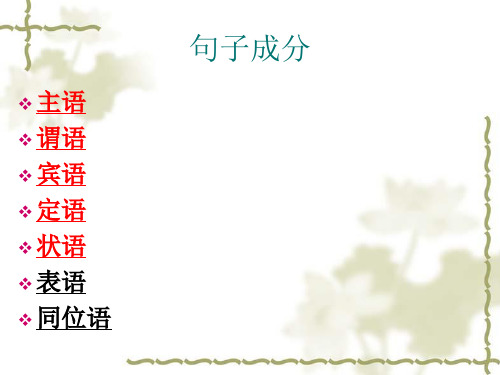
谓语
➢ 定义 谓语表示主语所做的动作或所处的状态。
➢ 分类 (1)简单谓语
(2) 复杂谓语
❖ 简单谓语:凡由一个动词(或动词词组)构 成的谓语都是简单谓语
Eg I like walking.(一般现在时主动语态)
I made your birthday cake last night. (一般 过去时主动语态)
carefully. ❖ China does not want to copy the USA’s
example.
✓ 代词
❖ It’s a young forest. ❖ I don’t know if it will grow. ❖ That’s a bit expensive. ❖ You’d better buy a new pair. ❖ I’m afraid we haven’t got any black shoes.
持续 He always keeps silent in class. This matter rests(remains) a mystery.\
表象
• He looks tired. • He lost his girlfriend so he seems to be very sad. 感官
rainy.(天气) ❖ How far is it? It’s about one kilometer away. (距
离)
✓ There be 句型中,be 作谓语,主语位居其后 ❖ There are many different kinds of
mooncakes. ❖ There will be a strong 语补足语)
有些及物动词除跟一个宾语外,还需要加上 宾语补足语,否则意思不完整,它们一起构成复 合宾语,复合宾语中宾语和后面的宾语补足语 有一种逻辑上的主谓关系,这也是判断是两 个宾语还是复合宾语的依据,宾语可以由名词 或起名词作用的词担任。
英语语法讲解课件-状语从句 ppt课件

ppt课件 10
ppt课件
11
状语从句分类
1. 2. 3. 4. 5. 6. 7. 8. 表示时间 表示地点 表示原因 表示结果 表示目的 表示条件 表示让步 表示比较
ppt课件 12
表示时间
一、时间状语从句 • When, as ,while, • before, after, • till, Until, • as soon as, • The moment, the minute, the first time…. (名词性短语)
ppt课件 21
E.G. 1. He was so angry that he left the room without a word. 他很生气,一句话不说就离开 了房间。 2. It is such a heavy box that nobody can move it. 3. The box is so heavy that nobody can move it. 4. The box is so heavy as nobody can move . 5. I didn’t go early, so that I didn’t get a seat.
ppt课件
30
表示比较
八、比较状语从句
主要由 • than, • as...as, • the more…the more • 这类从句常常有一些成分没有表示出来:
ppt课件 31
E.G.
• The more you eat, the fatter you are. • John is less clever than Tom. • He is not so/as clever as his brother.
ppt课件
ppt课件
11
状语从句分类
1. 2. 3. 4. 5. 6. 7. 8. 表示时间 表示地点 表示原因 表示结果 表示目的 表示条件 表示让步 表示比较
ppt课件 12
表示时间
一、时间状语从句 • When, as ,while, • before, after, • till, Until, • as soon as, • The moment, the minute, the first time…. (名词性短语)
ppt课件 21
E.G. 1. He was so angry that he left the room without a word. 他很生气,一句话不说就离开 了房间。 2. It is such a heavy box that nobody can move it. 3. The box is so heavy that nobody can move it. 4. The box is so heavy as nobody can move . 5. I didn’t go early, so that I didn’t get a seat.
ppt课件
30
表示比较
八、比较状语从句
主要由 • than, • as...as, • the more…the more • 这类从句常常有一些成分没有表示出来:
ppt课件 31
E.G.
• The more you eat, the fatter you are. • John is less clever than Tom. • He is not so/as clever as his brother.
ppt课件
英语语法16种时态介绍ppt课件
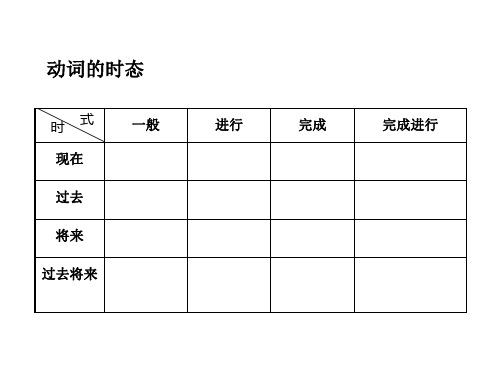
I'll write to you as soon as I arrive there. • 由if 引导的条件状语从句中可以用shall或will表
“意愿”,但不表示时态。
If you will accept my invitation and come to our party, my family will be pleased.如果你愿意接受并 参加我们的舞会,我的家人会非常高兴。
6)祈使句中 ( to give directions or instructions ) Go down the street, and then take the second turning on
the left.
知识扩展:一般现在时表将来
1)下列动词:come, go, arrive, leave, start, begin, return的一般 现在时表将来。这主要用来表示在时间上已确定或安排好的 事情 ( timetabled or fixed events )。 The train leaves at six tomorrow morning. When does the bus start? It starts in ten minutes.
You are always changing your mind. You are always doing well
He’s always asking the same question. 6. 状态动词的进行时后面接形容词brave; careful; stupid; clever; foolish; polite; kind; shy等时,为 主语所表现的非一般惯性特点或故意的行为。
6 )在the more…the more…句型中,从句也要用一 般现在时取代将来时。
“意愿”,但不表示时态。
If you will accept my invitation and come to our party, my family will be pleased.如果你愿意接受并 参加我们的舞会,我的家人会非常高兴。
6)祈使句中 ( to give directions or instructions ) Go down the street, and then take the second turning on
the left.
知识扩展:一般现在时表将来
1)下列动词:come, go, arrive, leave, start, begin, return的一般 现在时表将来。这主要用来表示在时间上已确定或安排好的 事情 ( timetabled or fixed events )。 The train leaves at six tomorrow morning. When does the bus start? It starts in ten minutes.
You are always changing your mind. You are always doing well
He’s always asking the same question. 6. 状态动词的进行时后面接形容词brave; careful; stupid; clever; foolish; polite; kind; shy等时,为 主语所表现的非一般惯性特点或故意的行为。
6 )在the more…the more…句型中,从句也要用一 般现在时取代将来时。
初中英语语法—时态(28张) PPT课件 图文

(4)现在完成时与表示一段时间的for短语、since短语或从句等 时,应注意句中的谓语动词须是延续性的,而不能是非延续性动词,如 come→be here,go→be there,die→be dead,borrow→keep,buy→h ,join→be in,leave→be away,begin to study→study等。
6.过去进行时
(1)概念:表示过去某一时刻或某一时间段内正在进行的动作。 (2)构成形式:was/were+动词的-ing形式 ①表示往返、位移的动词的过去进行时常可用来表示过去将来时
时态 We wanted to tell her that the train was_leaving an hour later.
1.一般现在时
基本用法: (1)表示经常性、习惯性的动作; He always helps others. 他总是帮助别人。
时态 (2)表示现在的情况或状态;
He is a teacher. 他是个老师。 (3)表示客观事实和普遍真理。 The sun rises in the east. 太阳从东边升起。 构成形式:am/is/are或实义动词的原形(主语是第三人称单数时,动 词要用第三人称单数形式)。
时态 (2)构成形式:have/has+动词的过去分词。
(3)与现在完成时连用的时间状语有for a long time,recently,yet, lately,ever,never,already,since,by this time,before,just,in t past/last few years,since+过去的时间点,since+时间段+ago,since +从句(一般过去时)。
表示感觉的动词。如:see,hear等。 表示喜欢或厌恶的动词。如:like,love等。 表示希望的动词。如:want,would like等。
初中英语语法课件ppt

vacation together.
过去将来时的使用:
一、过去将来时表示对于过去某一时间而言将要发生的动 作或存在的状态。 would或was /were going to + V
would可用于各种人称。
二、would +V还可表示过去的习惯动作,在这点上同used to同义。
When we were children, we would/used to go swimming every summer.
e) 用于条件从句“如果……想,设想”(接近if ……want to,或 if ……should) 例:Greater efforts to increase agricultural production must be made if food shortage ____________ avoided. A) is to be B) can be C) will be D) has been
一般现在时的动词形式: 动词原形 1.am;is ;are 2.have,has 3.第三人称单数形式-(e)s
肯定句:I watch television every day.
否定句:I don’t watch television every day.
疑问句:Do you watch television every day.
一般现在时的使用:
1.一般现在时表示总是、通常、习惯 性的动作或状态。
It snows in winter. I watch television every day.
2.用于对客观事实的普遍性的陈述。
Water consists of hydrogen and oxygen. Most animals kill only for food. The world is round.
过去将来时的使用:
一、过去将来时表示对于过去某一时间而言将要发生的动 作或存在的状态。 would或was /were going to + V
would可用于各种人称。
二、would +V还可表示过去的习惯动作,在这点上同used to同义。
When we were children, we would/used to go swimming every summer.
e) 用于条件从句“如果……想,设想”(接近if ……want to,或 if ……should) 例:Greater efforts to increase agricultural production must be made if food shortage ____________ avoided. A) is to be B) can be C) will be D) has been
一般现在时的动词形式: 动词原形 1.am;is ;are 2.have,has 3.第三人称单数形式-(e)s
肯定句:I watch television every day.
否定句:I don’t watch television every day.
疑问句:Do you watch television every day.
一般现在时的使用:
1.一般现在时表示总是、通常、习惯 性的动作或状态。
It snows in winter. I watch television every day.
2.用于对客观事实的普遍性的陈述。
Water consists of hydrogen and oxygen. Most animals kill only for food. The world is round.
英语语法基础知识PPT课件

数 人称 第一人称 第二人称
第三人称
单数
mine yours his hers its
复数
ours yours theirs
3)反身代词 表示反射(指一个动作回射到该动作执行者本身)或强 调(即用来加强名词或代词的语气)的代词叫做反身代 词。
数 人称 第一人称 第二人称
第三人称
单数
复数
3)反身代词 表示反射(指一个动作回射到该动作执行者本身)或强 调(即用来加强名词或代词的语气)的代词叫做反身代 词。
I saw many people walking along the lake.
The bridge built last year is now being repaired. 介词短语(prepositional phrase)如:
He came here by bus.
1.名词(noun)
the Great Wall Peiying Middle School
普通名词可进一步分为: 1)集体名词(collective noun): 集体名词是某一些人或物的总称。 例如:class team family army 2)物质名词(material noun) 物质名词表示物质或不具备确定形状和大小的个体的实物。 例如: water air hire steel grain 3)抽象名词(abstract noun) 抽象名词表示动作、状态、品质或其他抽象概念。 例如: happiness sadness work pleasure 名词又可分为可数名词(countable noun)和不可数名词 (uncountable noun): 可数名词: students computers tomatoes pianos 不可数名词: rain water pleasure advice 注意: glass glasses paper papers
高中英语语法大全PPT课件
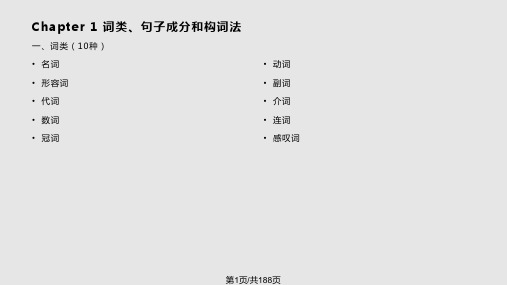
• 名词→动词 hand(手)→(传递),face(脸)→(面对)
• 形容词→副词 early→early, fast→fast
• 副词→连词 when(什么时候)→(当……时候)
• 介词→副词 in(到……里)→(在里面;在家),on(在…上)→(进行,继续),
第6页/共188页
Chapter 2 名词
• 专有名词 Beijing, Tom, the People’s Republic of China • 普通名词
▲可数名词 ▲不可数名词
第7页/共188页
一、英语可数名词的单复数
• 规则变化 ①在单数名词词尾加s ②s,o,x ,sh,ch结尾的词加es ③以辅音字母加y结尾的名词,变y为i,再加es ④以f或fe结尾的名词,变f或fe为v,再加es。
第15页/共188页
主主格格 宾宾格格
第第一一人人 称称单单数数
第第二二人人 称称单单数数
第第三三人人称称单单数数
男男
女女
II
YYoouu hhee
sshhee
((我我))
((你你))
((他他))
((她她))
mmee
yyoouu
hhiimm
hheerr
((我我))
((你你))
((他他))
((她她))
语或者表语,后面千万不可以跟名词 eg. This is your cup,but where is mine?(这是你的杯子,可我的在哪儿?) • 双重所有格:“of + 名词性物主代词”
第18页/共188页
第一人 第二人 称单数 称单数
第三人称单数
男
女
中性
第一人 第二人 第三人 称复 称复数 称复数 数
• 形容词→副词 early→early, fast→fast
• 副词→连词 when(什么时候)→(当……时候)
• 介词→副词 in(到……里)→(在里面;在家),on(在…上)→(进行,继续),
第6页/共188页
Chapter 2 名词
• 专有名词 Beijing, Tom, the People’s Republic of China • 普通名词
▲可数名词 ▲不可数名词
第7页/共188页
一、英语可数名词的单复数
• 规则变化 ①在单数名词词尾加s ②s,o,x ,sh,ch结尾的词加es ③以辅音字母加y结尾的名词,变y为i,再加es ④以f或fe结尾的名词,变f或fe为v,再加es。
第15页/共188页
主主格格 宾宾格格
第第一一人人 称称单单数数
第第二二人人 称称单单数数
第第三三人人称称单单数数
男男
女女
II
YYoouu hhee
sshhee
((我我))
((你你))
((他他))
((她她))
mmee
yyoouu
hhiimm
hheerr
((我我))
((你你))
((他他))
((她她))
语或者表语,后面千万不可以跟名词 eg. This is your cup,but where is mine?(这是你的杯子,可我的在哪儿?) • 双重所有格:“of + 名词性物主代词”
第18页/共188页
第一人 第二人 称单数 称单数
第三人称单数
男
女
中性
第一人 第二人 第三人 称复 称复数 称复数 数
小学英语语法汇总 ppt课件
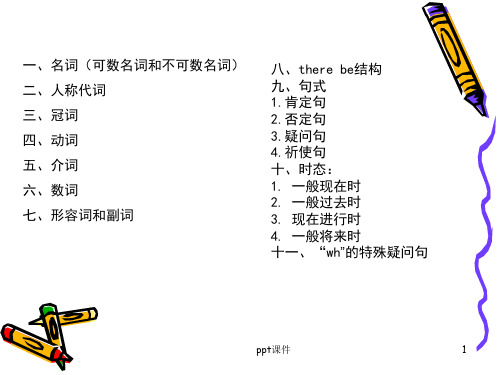
不规则名词的复数
ppt课件
5
Practise
1. peach_________ peaches 3. glass _________ glasses ladies 5. lady _________ 7. house ___________ houses 2. zoo _________ zoos 4. fox _______ foxes 6. policewoman policewomen _________ 8. photo _________ photos
childrengirls-girls’ James-James’s
1. 东西(没有现成的复合名词时): the book of the film
2. 东西的一部分: the bottom of the box 3. 抽象的概念: the price of success
4. 当of短语中的名词被另一个短语或从句修饰时:
ppt课件
6
二、人称代词
第一人称 主格: 宾格: 形容词性 物主代词: 名词性 物主代词: I me my mine we us our ours 第二人称 you you your yours she he 第三人称 it it its its they them their theirs
后跟名词 her him
以-s,-sh, -ch, -x, +es -z结尾的名词 大多数以-o结 尾的名词 +es
以元音字母加o +s 结尾的名词
以辅音字母加y 把y改成i再 [z] 结尾的名词 加es 以f和fe结尾 的大多数名词 把f或fe改 成v再加es [z]
ppt课件
4
1. 由元音字母的变化构成: man-men, tooth-teeth, foot-feet, mouse-mice, woman-women 2. 有些名词的复数形式与单数的形式一样: sheep, deer, fish(但也可以是fishes) 3. 有些名词变成复数时加-en: child-children, ox-oxen
高中英语语法——倒装(35张PPT)-经典通用课件资料

terrible Genie
neither/ nor did he stood a
助动词auxiliary/情态动词modal verb + subject + v +…
Nerve will I forgive you.
2021/10/10
4
全部倒装 1. 用于 there be 句型。
There are many students in the classroom.
原句自然顺序是: Many students are there in the classroom.
Grammar Inversion
2021/10/10
1
语法精解
1. 倒装 Inversions 英语句子的自然顺序是主语在前, 谓语在后。把谓语动词放在主语之前, 就叫倒装结构。如果全部谓语 放在主语之前, 叫全部倒装; 如果只把助动词或be 动词放在主语之前就叫部分倒装。
2021/10/10
2
主语位于谓语are there之后
2021/10/10
5
2. 用于“here (there, now, then) + 不及物动词 + 主语的句型中, 或以out, in, up, down, away 等副词开头 的句子里面,表示强调。
2021/10/10
6
Here comes the bus.
Hardly had she gone out
2021/10/10
32
3. I didn’t go there. He didn’t go there either. I didn’t go there, ________________.
4. A terrible Genie (妖怪) stood before the fisherman. Before the fisherman ______ _____________.
neither/ nor did he stood a
助动词auxiliary/情态动词modal verb + subject + v +…
Nerve will I forgive you.
2021/10/10
4
全部倒装 1. 用于 there be 句型。
There are many students in the classroom.
原句自然顺序是: Many students are there in the classroom.
Grammar Inversion
2021/10/10
1
语法精解
1. 倒装 Inversions 英语句子的自然顺序是主语在前, 谓语在后。把谓语动词放在主语之前, 就叫倒装结构。如果全部谓语 放在主语之前, 叫全部倒装; 如果只把助动词或be 动词放在主语之前就叫部分倒装。
2021/10/10
2
主语位于谓语are there之后
2021/10/10
5
2. 用于“here (there, now, then) + 不及物动词 + 主语的句型中, 或以out, in, up, down, away 等副词开头 的句子里面,表示强调。
2021/10/10
6
Here comes the bus.
Hardly had she gone out
2021/10/10
32
3. I didn’t go there. He didn’t go there either. I didn’t go there, ________________.
4. A terrible Genie (妖怪) stood before the fisherman. Before the fisherman ______ _____________.
基本英语语法大全PPT课件PPT42页

各时态中的
“四大基本句型”
.
1第2页,共42页。
什么是四大基本句型
1 主动句型:主语+谓语(动词或 动词短语)
I study. We listen to the music. She takes care of her baby.
.
2第3页,共42页。
2 被动句型:主语+谓语( Be的过去分词)
I am thirsty.
My father is an engineer.
It will be cloudy tomorrow.
He has been in Beijing.
.
21第22页,共42页。
2变得:get, turn, grow, go, fall, become, come
He got angry. The leaves have turned red. The man has grown old. It never goes wrong. She soon fell asleep. My dream has come true.
一、时态的定义:时间+状态 二、时态的划分方法: 三、对四个时间段和四种状态的定义 时间分为:现在,过去,将来,过去将来。 状态分为:一般,进行,完成,完成进行。共 组合16种时态,其中8种是常用的。
.
23第24页,共42页。
感官联系动词:看起来, 听上去,闻 起来, 尝起来,摸起来,看来,显得 等等。
You look great.
His advice sounds reasonable.
The cheese smelled terrible.
The table feels smooth.
“四大基本句型”
.
1第2页,共42页。
什么是四大基本句型
1 主动句型:主语+谓语(动词或 动词短语)
I study. We listen to the music. She takes care of her baby.
.
2第3页,共42页。
2 被动句型:主语+谓语( Be的过去分词)
I am thirsty.
My father is an engineer.
It will be cloudy tomorrow.
He has been in Beijing.
.
21第22页,共42页。
2变得:get, turn, grow, go, fall, become, come
He got angry. The leaves have turned red. The man has grown old. It never goes wrong. She soon fell asleep. My dream has come true.
一、时态的定义:时间+状态 二、时态的划分方法: 三、对四个时间段和四种状态的定义 时间分为:现在,过去,将来,过去将来。 状态分为:一般,进行,完成,完成进行。共 组合16种时态,其中8种是常用的。
.
23第24页,共42页。
感官联系动词:看起来, 听上去,闻 起来, 尝起来,摸起来,看来,显得 等等。
You look great.
His advice sounds reasonable.
The cheese smelled terrible.
The table feels smooth.
小学英语小学英语语法课件-系动词、实义动词和助动词 (共30张PPT) 全国通用
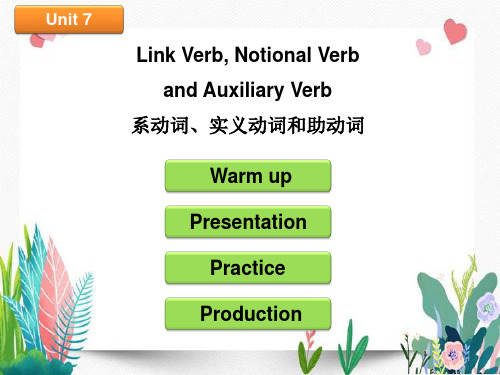
否定句:
主语+助动词do/does+not+实义动 I don’t like fruit.
词原形+其他
主语+主动动词not+动词形式+其他 He won’t go fishing.
句 型 结 构
一般疑问句:
助动词Do/Does+主语+实义动词原 形+其他? 助动词+主语+动词形式+其他?
Do you like fruit? Have you ever read this book?
Practice Oral Practice
— ____D_id_____ your brother go shopping last night? — No, he ____d_i_d____ (do) his homework at home. I ___h_a_v_e___ ____b_e_e_n____ (be) to Disney twice.
Presentation Grammar Box
系动词be的句型结构
肯定句:主语+系动词be+其他 He is a police officer. 他是一名警察。
句 否定句:主语+be+not+其他 型
He is not a police officer. 他不是警察。
结 一般疑问句:Be+主语+其他? Is he a police officer?
_tr_a__n_s_f_e__r,__b_e__c_a_m__e__________________________________ 助动词:_w_i_ll_, _h_a_v_e_n_’t_,_s_h_o_u_l_d_,_d_o_e_s_,_d_i_d_n_’t_____________
初中英语语法专题课件完整版(共983张PPT)

2.不规则变化
构成方法
例词
形式不变 (单复数同形)
sheep-sheep deer-deer Chinese-Chinese Japanese-Japanese
变内部元音字母
foot-feet tooth-teeth goose-geese man-men mouse-mice
词尾加-en/-ren
a group of 一队,一组,一群
②还可用much,little,a little of,a large amount/deal of, no,plenty of等来修饰不可数名词,some,any既可修饰可数名词也可修 饰不可数名词。
much money,plenty of water a little of air some(肯定句): some milk ,some apples any(疑/否):Are there any stamps?I don’t have any money (5)数词-名词-形容词构成的复合形容词,中间的名词不能用
普通名词又可分为下面四类:
1)个体名词:表示单个人或单个事物。 如:gun、kid 、book。 2)集体名词:表示一群人或一些事物组成的集合体。 如:family。
3)物质名词:表示无法分为个体的物质、材料、食品、饮料、液体、气体、 金属等名称的名词,
如:pork、wood、bread、water、air。 4)抽象名词:表示动作、状态、品质、感情等抽象概念及学科、疾病。 如:work 。Hunger、honesty 、love、Chinese、success、HIV。 个体名词和集体名词可以用数目来计算,称为可数名词。
f,fe 为v,再加 -es
shelf-shelves thief-thieves
英语语法-动词不定式PPT课件

-Yes. I think that’s 2 years ago.
√ a. sfeoerget/br.esmeeeimngberct.otodoseseth.
d. saw
forget/remember doing sth.
stop/go on to do sth
stop/go on doing sth
宾语
4. People eat to live, but not live to eat.
5. I have a lot to tell you.
6.
定语 It’s not right to be always thinking of oneself.
7. We often see him play football.
(目的) (目的)
(结果)
第5页/共22页
4.用作主语(这时可将其用形式主语it来替换) 1.To be an actress is my dream. It is my dream to be an actress. 2. To go abroad is his dream. It is his dream to go abroad. 3. To say is easy, to do is difficult. It is easy to say, it is difficult to do.
todo表示目的doctordidwhathecoulddo作定语如是不及物动词构成不定式短语作定语其后需接介词第21页共22页感谢您的观看
动词不定式的基本形式是“to+动词原形 “,有时可以不带to.
动词不定式没有人称和数的变化,在句子中 不能作谓语。在句中可以作主语、表语、宾 语、宾语补足语、定语和状语。
小学英语语法全套PPTppt课件

2.行为动词:主语 行为动词( 其它)。如: We study English.我们学习英语。 当主语为第三人称单数(he, she, it)时,
要在动词 后加“-s”或“-es” 如:Mary likes Chinese.玛丽喜欢汉语。
一般现在时的变化 1. be动词的变化。 否定句:主语 be not 其它。
❖2. I do my homework every day.(改为一般疑 问句,作否定回答) ______________________________________
当主语为第三人称单数,要用does构成一般疑 问句
如 -Does she go to work by bike? - Yes, she does. / No, she doesn't.
动词 s的变化规则 1.一般情况下,直接加-s,
如:cook-cooks, milk-milks
2.以s. x. sh. ch. o结尾,加-es, 如:guess-guesses, wash-washes, watch-watches, go-goes
strawberry _____
thief _____
you _____ peach___ sandwich ___
man_____ woman___
一般现在时
一般现在时基本用法介绍 一般现在时的功能 1.表示事物或人物的特征、状态。
如:The sky is blue.天空是蓝色的。 2.表示经常性或习惯性的动作。
如: I don't like bread. 当主语为第三人称单数,用doesn‘t构成否定句
如:He doesn't often play.
一般疑问句:Do( Does ) 主语 动词原形 其它。 如- Do you often play football? - Yes, I do. / No, I don't.
要在动词 后加“-s”或“-es” 如:Mary likes Chinese.玛丽喜欢汉语。
一般现在时的变化 1. be动词的变化。 否定句:主语 be not 其它。
❖2. I do my homework every day.(改为一般疑 问句,作否定回答) ______________________________________
当主语为第三人称单数,要用does构成一般疑 问句
如 -Does she go to work by bike? - Yes, she does. / No, she doesn't.
动词 s的变化规则 1.一般情况下,直接加-s,
如:cook-cooks, milk-milks
2.以s. x. sh. ch. o结尾,加-es, 如:guess-guesses, wash-washes, watch-watches, go-goes
strawberry _____
thief _____
you _____ peach___ sandwich ___
man_____ woman___
一般现在时
一般现在时基本用法介绍 一般现在时的功能 1.表示事物或人物的特征、状态。
如:The sky is blue.天空是蓝色的。 2.表示经常性或习惯性的动作。
如: I don't like bread. 当主语为第三人称单数,用doesn‘t构成否定句
如:He doesn't often play.
一般疑问句:Do( Does ) 主语 动词原形 其它。 如- Do you often play football? - Yes, I do. / No, I don't.
《英语语法大全》PPT课件

04
(6)介词—副词 ,如:in(到……里)—(在里面;在家 ),on(在…上)—(进行 ,继续),等等
05
谢谢
2、派生法:
1)派生名词:
●动词 +er/or
●动词 +ing
●动词 +(t)ion
●形容词 +ness
●其他 ,如:inventor
learner swimming congratulation kindness
carelessness knowledge
2)派生形容词:
●Chinese; Japanese
07lish
●French
●German
●名词 +y
02
03
01
04
05
●名词 +ful
●dangerous
●动词 +ing/ed
●friendly
●国名 +(i)an 如:snowy sunny hopeful beautiful interesting following
daily(每日的 ) nervous delicious
7、宾语补足语 用来说明宾语怎么样或干什么 ,通常由形容词或动词充当。
如:They usually keep their classroom clean.
他们通常让教室保持清洁。
He often helps me do my lessons.
他常常帮我做功课。
The teacher wanted me to learn French all by myself.
如:He can spell the word.(他能拼这个词 )
有些及物动词带有两个宾语,一个指物 ,一个指人。指物的叫直接宾语,指人的叫间接宾语。间接宾语一般放在直接宾语的前面。 如:He wrote me a letter . (他给我写了一封信 )
(6)介词—副词 ,如:in(到……里)—(在里面;在家 ),on(在…上)—(进行 ,继续),等等
05
谢谢
2、派生法:
1)派生名词:
●动词 +er/or
●动词 +ing
●动词 +(t)ion
●形容词 +ness
●其他 ,如:inventor
learner swimming congratulation kindness
carelessness knowledge
2)派生形容词:
●Chinese; Japanese
07lish
●French
●German
●名词 +y
02
03
01
04
05
●名词 +ful
●dangerous
●动词 +ing/ed
●friendly
●国名 +(i)an 如:snowy sunny hopeful beautiful interesting following
daily(每日的 ) nervous delicious
7、宾语补足语 用来说明宾语怎么样或干什么 ,通常由形容词或动词充当。
如:They usually keep their classroom clean.
他们通常让教室保持清洁。
He often helps me do my lessons.
他常常帮我做功课。
The teacher wanted me to learn French all by myself.
如:He can spell the word.(他能拼这个词 )
有些及物动词带有两个宾语,一个指物 ,一个指人。指物的叫直接宾语,指人的叫间接宾语。间接宾语一般放在直接宾语的前面。 如:He wrote me a letter . (他给我写了一封信 )
《英语语法大全》PPT课件
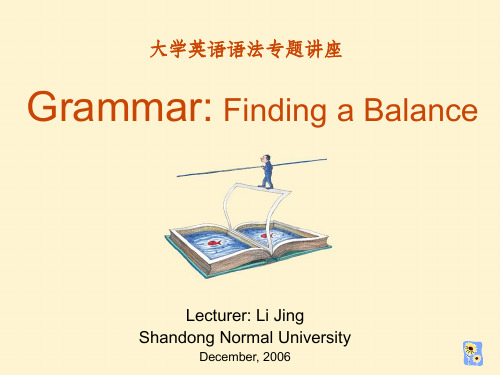
I’m thank you all the same.(画蛇添足) Please sent it to me. I must to learn the book.
---
不要眼高手低
I was at the point of telephoning him when his letter arrived.
● To gain a balanced view of grammar study, recognize the importance of accuracy in language use.
正确对待语法学习,认识到准确使用语言的重要性.
● To acquire both knowledge of grammatical forms and skill in using the forms.
---
语法与读写
One day, a lion named Jack was sleeping beside a tall tree. Just then, Jim, a cat, walk towards the lion, woke him up with a light pat and said: “Why don’t we have a game?” “Uh, that’s a great idea. But what can I benefit from it?” “A delicious meal.” “OK.” Nodded the lion. Jack stand up and walk towards the forest. They then saw a crowd of pigs playing together. The cat whispered: “Go and see who will be the first one to catch them.” Jack rushed out at once and catch a small unlucky pig. “Ha Ha, I win the game!” “Don’t be so eager. Now let’s see who can climb the tree with that meat.” With those words, the cat grabbed the meat and climbed to the top. The lion struggled to climbˇ the tree but he failed. “We have a tie, Jim. And what’s the next?” “Ha ha, the next stage is who can enjoy the meat as quickly as possible!” laughed Jim.
---
不要眼高手低
I was at the point of telephoning him when his letter arrived.
● To gain a balanced view of grammar study, recognize the importance of accuracy in language use.
正确对待语法学习,认识到准确使用语言的重要性.
● To acquire both knowledge of grammatical forms and skill in using the forms.
---
语法与读写
One day, a lion named Jack was sleeping beside a tall tree. Just then, Jim, a cat, walk towards the lion, woke him up with a light pat and said: “Why don’t we have a game?” “Uh, that’s a great idea. But what can I benefit from it?” “A delicious meal.” “OK.” Nodded the lion. Jack stand up and walk towards the forest. They then saw a crowd of pigs playing together. The cat whispered: “Go and see who will be the first one to catch them.” Jack rushed out at once and catch a small unlucky pig. “Ha Ha, I win the game!” “Don’t be so eager. Now let’s see who can climb the tree with that meat.” With those words, the cat grabbed the meat and climbed to the top. The lion struggled to climbˇ the tree but he failed. “We have a tie, Jim. And what’s the next?” “Ha ha, the next stage is who can enjoy the meat as quickly as possible!” laughed Jim.
- 1、下载文档前请自行甄别文档内容的完整性,平台不提供额外的编辑、内容补充、找答案等附加服务。
- 2、"仅部分预览"的文档,不可在线预览部分如存在完整性等问题,可反馈申请退款(可完整预览的文档不适用该条件!)。
- 3、如文档侵犯您的权益,请联系客服反馈,我们会尽快为您处理(人工客服工作时间:9:00-18:30)。
.
7
3.构成特定意义的前缀(续2) full- 完全 full-speed (全速) full- 全部,整个 full-year (整年) half- 半 half-asleep (半睡的) hand- 手工的 hand-made (手工制作的) hydro- 水力的 hydro-electric (水电的) ill- 不好的 ill-tempered (坏脾气的) ill- 不适宜的 ill-chosen (选错的) inter- 之间的 international (国际的) inter- 相互的 interchange (互换) kilo- 千 kilometer (千米)
英语语法
Unit 1
.
1
本单元学习要点
• 英语的主要词类 (word class / parts of speech)
掌握各类词的代表符号;各类词的拼读特征 • 各种词类之间的配合关系
• 各种词类在句子中的功能
• 由各种词类组成正确的句子
.
2
Activity 1 熟悉词类Word (词) Nhomakorabeaapple…
num. 表达数量或顺序
red, hot…
形容词 adjective
adj. 表达人、事、物的性质(修饰名词)
quickly, fast… 副词 adverb
ad. 表达动作的方式或状况(修饰动词)
give, teach… 及物动词 transitive verb vt.
表达需要有承受者的动作
think,fly 不及物动词 intransitive verb vi.
1.改变词性的前缀
a- 加在名词前构成形容词或副词 如 asleep
be- 加在名词或形容词前构成动词 如 befriend
em-加在名词前构成动词 如 embed
en-加在名词前构成动词 如 enrich
out-加在名词或形容词前构成动词 如 outnumber
.
4
2.构成反义词的前缀 de- (非) decolonize (非殖民地化) dis- (不,非) dislike (不喜欢) il- (非) illegal (非法) im- (不,非) impatient (不耐烦) in- (不) irresponsible (不负责任) mal- (不) malnutrition (营养不良) non- (不) non-economic (不经济) un- (不) unable (不能够)
表达不需要承受者的动作
do, have, be 助动词 auxiliary verb v. aux. 协助动词构成各种句型(英语特有)
for, on… 介词(前置词) preposition
prep. 表明动作的方位、方向、方式
and, but, or…
连词 conjunction
conj. 连接句子中各种成分
.
5
3.构成特定意义的前缀 all- 纯,全是 all-steel (全钢) all- 各个 all-purpose (各种目的) anti- 反,抗 anti-inflation (反通涨) arch- 大的 archbishop (大主教) arch- 头号的 arch-enemy (头号敌人) auto- 自动的 automatic (自动的) auto- 自己的 autonomous (自治的) bi- 双的,二 bilingual (双语的) bio- 生物的 biology (生物学) centi- 百分之一的 centimeter (厘米)
wow, oh…
感叹词 interjection
int. 用于感叹
.
3
学习要点:词的构成:
英语的词多数都是从词根发展演变出来的,因此应首先 熟悉常用词根。
在词根上加上前缀或后缀,即可以演变出和词根含义相 关的新的词汇。掌握好前缀和后缀的内涵,就可以举一反三, 在不查词典的情况下即弄懂许多词。
常用前缀的含义(prefix)
.
9
3.构成特定意义的前缀(续4) re- 再,重新 repeat (重复) self- 自行 self-taught (自学) self- 自己的 self-defence (自卫) semi- 半 semi-conductor (半导体) sub- 从属的 sub-company (分公司) super- 超级的 super-power (超级大国) super- 超…的 super-sonic (超音速的) tele- 远程的 television (电视机,即远程影像) trans- 从…到…的 translate (翻译) trans- 跨越 transSiberian (跨西伯利亚的)
.
8
3.构成特定意义的前缀(续3) mal- 不良的 malfunction (故障) man- 人的 man-made (人造的) mid- 中间的 midday (正午) milli- 千分之一的 millimeter (毫米) mini- 微小的 minibus (小巴) mis- 错误的 misunderstand (误解) over- 过于 overheated (过热的) post- 之后的 postwar (战后) pre- 之前的 pre-heat (预热) pro- 支持…,亲…的 pro-government (亲政府的)
名词
Word Class (词类或词性) noun
代号 n.
用途 人、事、物或抽象概念的直接称呼
we, he, her...
代词 pronoun
pron. 代表人、事、物或抽象概念的称呼
a, an, the
冠词 article
art. 指示名词(英语特有,代词弱化)
one, first… 数(量)词 numeral
.
6
3.构成特定意义的前缀(续1) co- 共同 co-operate (合作) counter- 反 counter-attack (反攻) down- 向下 downhill (下坡) ever- 一直 evergreen (常青) ever- 越来越 ever stronger(用比较级)(越来越壮) ex- 以前的 ex-president (前总统) extra- 特别的,超 extra-bright (超亮的) fore- 前部的 forehead (前额) fore- 预见的 foresee (预见) free- 自由的 free-moving (用动名词) (自由运动)
